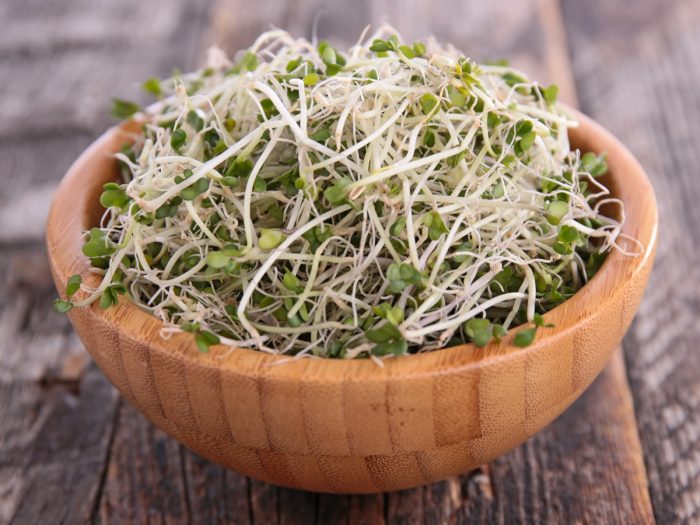Many people eat broccoli all the time, but broccoli sprouts aren’t something you see on every dinner table. These incredibly nutritious sprouts are not only an easy addition to many meals but are readily available in many parts of the world, thanks to their health benefits.
What are Broccoli Sprouts?
Broccoli sprouts are the earliest forms of broccoli before they form their thick stalks and recognizable florets. Broccoli sprouts are typically picked when they are only 3-5 days old and closely resemble alfalfa or bean sprouts. However, their taste is slightly more earthy and peppery. It is only in the past 20 years that the value of broccoli sprouts got fully realized. These young vegetables are packed with several unique compounds, including glucoraphanin. This phytochemical is a type of glucosinolate that can be converted into sulforaphane in the body. [1]
Due to the explosion of popularity surrounding broccoli sprouts, and thanks to its unique chemical composition, there are now many different ways to grow your own sprouts. They are also available with natural grocers and health food stores. That being said, these sprouts also contain compounds, nutrients, and minerals that are important for maintaining overall health.
Broccoli Sprouts Nutrition
Broccoli sprouts have a rich supply of vitamin K, but its overall levels of vitamin A and vitamin C are lower than full-grown broccoli. There is a dense supply of protein and dietary fiber in broccoli sprouts, as well as a low level of calories (~35 per 3 ounces). There is no known fat content and a low level of carbohydrates. However, as mentioned above, the main reason that these sprouts have captured so much attention is their glucosinolate content, namely the sulforaphane that is produced. [2]

Add broccoli sprouts to your salads or sandwiches for a nutritious boost. Photo Credit: Shutterstock
Health Benefits of Broccoli Sprouts
The most important health benefits of broccoli sprouts include its ability to lower signs of premature aging, slow the progression of chronic disease, boost heart health, optimize gastrointestinal function, boost the immune system, and even lower the risk of autism, among others.
Prevent Premature Aging
The powerful antioxidants and active compounds found in broccoli sprouts have been directly connected with free radical activity and oxidative stress in the body. In addition to the vitamin A and C found in these sprouts, this can help reduce aging by eliminating wrinkles and age spots, while also increasing the elasticity of your skin. [3]
Improve Brain Health
Some studies have linked a diet rich in sulforaphane-filled broccoli sprouts and a reduced chance of autism in your children. This could be due to the powerful antioxidant activity of these sprouts, which can ensure normal brain development. [4]
Aid in Digestion
If you struggle with digestive health, broccoli sprouts can protect the immune system of the gut and reduce the presence of dangerous bacteria, such as H. pylori, and optimize the bacterial balance, ensuring good nutrient uptake and digestive health. [5]
Improve Heart Health
Research has shown that sulforaphane helps protect heart health in two different ways – lowering the level of triglycerides and reducing blood pressure. This can lower your overall risk of cardiovascular issues like atherosclerosis, heart attacks, and strokes. [6]
How to Eat Broccoli Sprouts?
- Broccoli sprouts can be used in your daily diet in multiple ways, such as a flavorful, peppery addition to a salad, or as a lettuce replacement on sandwiches and wraps.
- Many people also enjoy eating broccoli sprouts by themselves, perhaps with a dash of garlic salt for flavor.
- You can use these sprouts in stir-fries, salsas and in other dips.
- You can even blend the sprouts into your hummus to give your snack foods a healthy boost.
How to Grow Broccoli Sprouts?
If you want to grow broccoli sprouts at home, it’s surprisingly easy to do!
- You can put the broccoli seeds in a large glass jar and cover them with about 2 inches of water.
- In the morning, drain off the water, rinse the seeds and repeat this process 3-4 times, always storing the seeds in a cool, dark place.
- Within a few days, the seeds will split open and the sprouts will begin to grow.
- Continue rinsing the sprouts 3 times per day, but they can now be moved out into the sunshine.
- Once the leaves turn a dark green (within another 3-4 days), they will be ready to be harvested and used in your meals!
